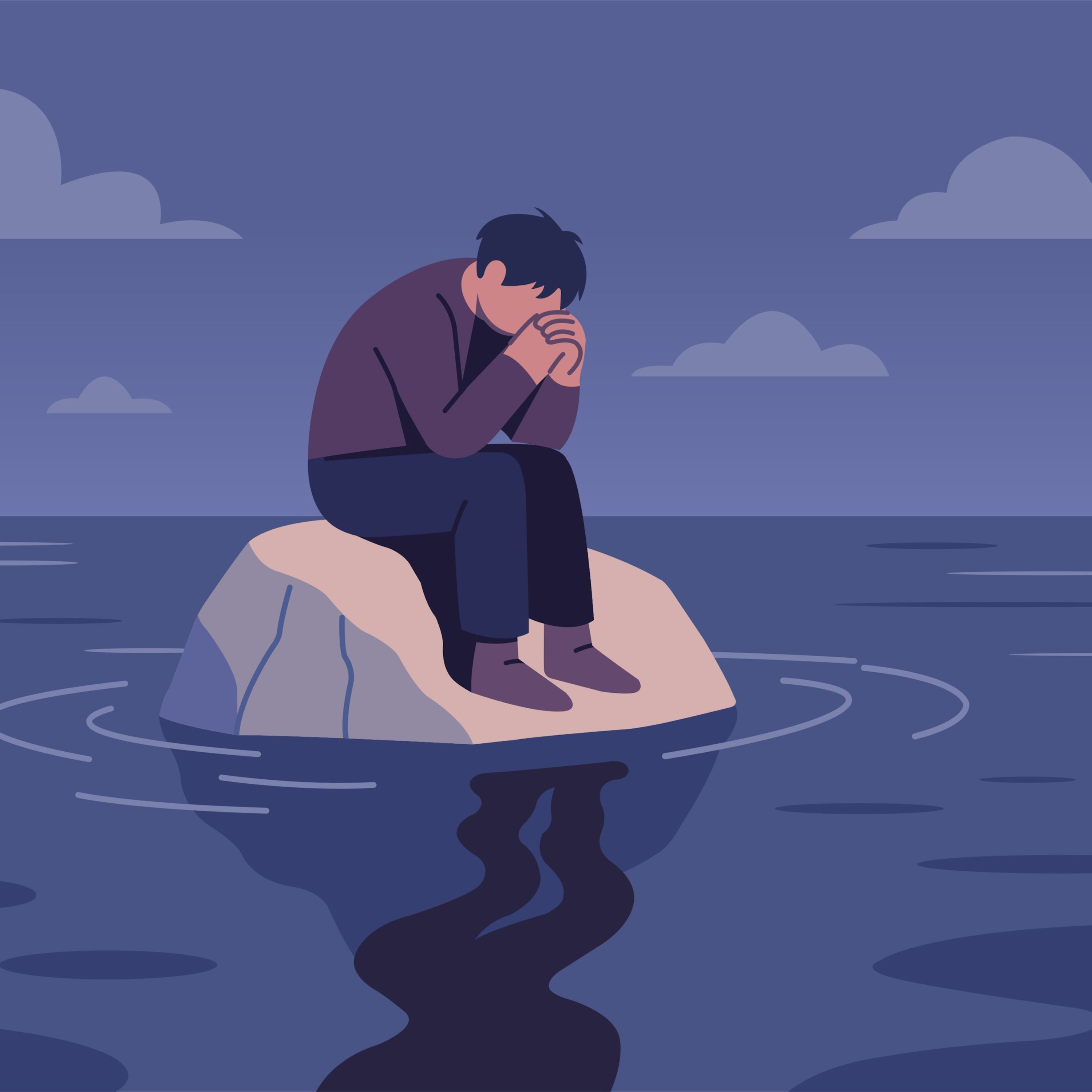Discover Hidden Brain
Hidden Brain

Hidden Brain
Author: Hidden Brain, Shankar Vedantam
Subscribed: 1,090,179Played: 18,895,277Subscribe
Share
© All Rights Reserved
Description
Why do I feel stuck? How can I become more creative? What can I do to improve my relationships? If you’ve ever asked yourself these questions, you’re not alone. On Hidden Brain, we help you understand your own mind — and the minds of the people around you. (We're routinely rated the #1 science podcast in the United States.) Hosted by veteran science journalist Shankar Vedantam.
574 Episodes
Reverse
It's not easy for most of us to receive negative feedback. Even when the person delivering that feedback is constructive and reasonable, we often feel the urge to defend ourselves. This week, we look at the psychology of defensiveness with neuroscientist Emily Falk. We'll explore what causes so many of us to resist constructive criticism, and how we can get better at giving and receiving such feedback. Then, in the latest installment of our ongoing series "Your Questions Answered," psychologist Ciara Greene returns to the show to answer your questions about memory and forgetfulness.If you have follow-up questions or thoughts for Emily Falk after listening to today’s conversation, and you’d be willing to share with the Hidden Brain audience, please record a voice memo on your phone and email it to us at ideas@hiddenbrain.org. Use the subject line “mental barriers.” Thanks! Our next stops on the Hidden Brain tour are coming up! Join us in Baltimore on October 11, Washington, D.C. on October 12, or Los Angeles on November 22. And stay tuned for more cities to be added for 2026. For more info and tickets, go to https://hiddenbrain.org/tour. Episode illustration by Getty Images for Unsplash+ Hosted by Simplecast, an AdsWizz company. See pcm.adswizz.com for information about our collection and use of personal data for advertising.
Many of us have been raised to believe that if we want to get something done, we just need to set our minds to it. Where there's a will, there's a way, right? Yet somehow we end up polishing off that pint of ice cream in the freezer, or spending more than our budget allows. It's almost as if we're not the ones in charge. This week, we talk with psychologist and neuroscientist Emily Falk about why our minds often conspire against our best interests, and how we can regain control. Do you have follow-up questions or thoughts for Emily Falk after listening to today’s conversation? If you’d be willing to share with the Hidden Brain audience, please record a voice memo on your phone and email it to us at ideas@hiddenbrain.org. Use the subject line “mental barriers.” Thanks!And if you love Hidden Brain, please consider joining our podcast subscription, Hidden Brain+. We're currently offering an extended 30-day free trial for all listeners who subscribe on Apple Podcasts during the month of September. To sign up, click the "Subscribe" or "Try Free" button in Apple Podcasts, or go to apple.co/hiddenbrain. Your subscription helps to fund the research, writing, and sound design that go into every episode of the show. We appreciate your support! Episode illustration by Fast Ink on Unsplash Hosted by Simplecast, an AdsWizz company. See pcm.adswizz.com for information about our collection and use of personal data for advertising.
Perfectionism is everyone’s favorite flaw. It’s easy to assume that our push to be perfect is what leads to academic, athletic, and professional success. But how do we distinguish between high standards and unrealistic expectations? This week, we bring you a favorite conversation with psychologist Thomas Curran. He says perfectionism has a dark side, and that there are much healthier ways to strive for excellence. Then, we bring you the latest edition of our segment "Your Questions Answered." Sociologist Allison Pugh returns to the show to respond to listener questions about connective labor — the work of seeing another person, and having that person feel seen.The Hidden Brain tour continues this fall! Join us in Baltimore on October 11, Washington, D.C. on October 12, or Los Angeles on November 22. More info and tickets at hiddenbrain.org/tour.Episode image by Dadi Prayoga for Unsplash.com. Hosted by Simplecast, an AdsWizz company. See pcm.adswizz.com for information about our collection and use of personal data for advertising.
When tragedy strikes, it’s natural to be devastated. But psychologist George Bonanno finds that many of us recover from life’s blows more quickly than we might expect. This week, we talk with Bonanno about his research and why it has changed how many scientists think about trauma and resilience.Do you have follow-up questions or comments after listening to this episode? If you’d be willing to share your thoughts with the Hidden Brain audience, please record a voice memo on your phone and email it to us at ideas@hiddenbrain.org. Use the subject line “trauma.” Thanks! Episode illustration by Ahmed Hossam on Unsplash Hosted by Simplecast, an AdsWizz company. See pcm.adswizz.com for information about our collection and use of personal data for advertising.
Have you ever fallen asleep in school or during a work meeting? Maybe you felt your eyes glaze over as your boss or a teacher droned on and on about a topic that had no relevance to you. What's missing from these classrooms and conference rooms is engagement: A state of being absorbed, alert, and eager to learn. This week, psychologist and neuroscientist Mary Helen Immordino-Yang explores why so many of us feel apathetic at school and at work, and how to cultivate the magic of engagement.Do you have follow-up questions or comments after listening to this episode? If you’d be willing to share your thoughts with the Hidden Brain audience, please record a voice memo on your phone and email it to us at ideas@hiddenbrain.org. Use the subject line “learning.” Thanks! Episode photo by Ismail Salad Osman Hajji dirir on Unsplash Hosted by Simplecast, an AdsWizz company. See pcm.adswizz.com for information about our collection and use of personal data for advertising.
Aging isn’t just a biological process. Our outlooks and emotions also change as we age, often in ways that boost our well-being. This week, we revisit a favorite conversation with psychologist Laura Carstensen, who helps us unpack the science behind this surprising finding, and shares what all of us can learn from older people. Then, as part of our ongoing series "Your Questions Answered," we revisit our follow-up chat with Laura, who responds to listeners' thoughts and questions and shares more of her research on what it means to live well as we age.Come see Shankar in person and help us to celebrate Hidden Brain's tenth anniversary! Our next stops on our "Perceptions" tour are Mesa, Baltimore, Washington, D.C., and Los Angeles. For more info and tickets, visit https://hiddenbrain.org/tour/Episode photo by Hector Reyes on Unsplash Hosted by Simplecast, an AdsWizz company. See pcm.adswizz.com for information about our collection and use of personal data for advertising.
Why do some people risk their own lives to help another person, or give away their fortunes for the benefit of strangers? This week, we talk with psychologist and neuroscientist Abigail Marsh, who studies the science of altruism. We'll explore what's known about the brains of people who perform acts of remarkable selflessness, and how the rest of us can learn to be more like them. Do you have follow-up questions, comments, or stories about altruism and generosity after listening to this episode? If you'd be comfortable sharing with the Hidden Brain audience, please record a voice memo on your phone and email it to us at ideas@hiddenbrain.org. Use the subject line “generosity.” And if you liked today's conversation, please check out our sister podcast, "My Unsung Hero." You can find the show on this podcast platform, or by visiting our website: https://hiddenbrain.org/myunsunghero/The Hidden Brain tour heads to Toronto on Wednesday, August 6! Join Shankar there or at one of our upcoming stops in Baltimore, Washington, D.C., or Los Angeles. More info and tickets here: https://hiddenbrain.org/tour/ Hosted by Simplecast, an AdsWizz company. See pcm.adswizz.com for information about our collection and use of personal data for advertising.
We all tell stories about ourselves, often without realizing we’re doing so. How we frame those stories can profoundly shape our lives. In our latest You 2.0 episode, we bring you a favorite conversation with psychologist Jonathan Adler. He shares how to tell our stories in ways that enhance our wellbeing. Then, Max Bazerman answers your questions about the science of negotiation.Do you have follow-up questions or ideas that you’d like to share after listening to our conversation with Jonathan Adler? How do you tell the story of your life, and how does that shape the way you see yourself? If you’re comfortable sharing your thoughts and questions with the Hidden Brain audience, please record a voice memo on your phone and email it to us at ideas@hiddenbrain.org. Use the subject line “personal stories.” Hidden Brain's "Perceptions" tour is continuing this fall! Join Shankar at an upcoming stop; more info and tickets here: https://hiddenbrain.org/tour/Episode Illustration by Art Attack on Unsplash Hosted by Simplecast, an AdsWizz company. See pcm.adswizz.com for information about our collection and use of personal data for advertising.
What does it mean to be stoic? Many of us assume it means you have a stiff upper lip, or that you suppress your emotions. That's what Massimo Pigliucci thought — until he started to peruse a book called Meditations. It was written nearly two thousand years ago by the Roman Emperor Marcus Aurelius. But Massimo, now a philosopher, says Meditations, and Stoic philosophy more broadly, offer wisdom that continues to speak to our lives. This week, we explore Stoic ideas and what they tell us about a life well lived. Do you have follow-up questions and ideas about stoicism after listening to this episode? If you’d be comfortable sharing your comments and questions with the Hidden Brain audience, please record a voice memo on your phone and email it to us at ideas@hiddenbrain.org. Use the subject line “stoicism.” Photo by Kenny Eliason on Unsplash Hosted by Simplecast, an AdsWizz company. See pcm.adswizz.com for information about our collection and use of personal data for advertising.
Many of us believe that hard work and persistence are the key to achieving our goals. But is that true when it comes to the pursuit of happiness? This week, we revisit a conversation with psychologist Iris Mauss, who explains why happiness can seem more elusive the harder we chase it, and what we can do instead to build a lasting sense of contentment. Then, we bring you the latest edition of our segment "Your Questions Answered." Behavioral scientist Alison Wood Brooks answers listener questions on how to be a better conversationalist — from what to do when the other person isn't contributing, to how to stop others from interrupting.Miss our original episodes with Alison Wood Brooks? They're called "We Need to Talk" and "The Conversations that Bring Us Closer." Do you have follow-up questions, thoughts, or ideas about the pursuit of happiness after listening to our conversation with Iris Mauss? If you'd be comfortable sharing your thoughts with the Hidden Brain audience, please record a voice memo on your phone and email it to us at ideas@hiddenbrain.org. Use the subject line "happiness." Thanks! Hosted by Simplecast, an AdsWizz company. See pcm.adswizz.com for information about our collection and use of personal data for advertising.
You’ve probably heard the saying, “Do what you love, and you’ll never work a day in your life.” The idea is that pursuing your passion will feel invigorating — almost magical. But passions can easily wane over time. This week, behavioral scientist Jon Jachimowicz looks at how to keep our passions alive, and how to channel old passions into new pursuits.Do you have follow-up questions for Jon Jachimowicz, or ideas that you'd like to share after listening to this episode? If you'd be willing to share them with the Hidden Brain audience, please record a voice memo on your phone and email it to us at ideas@hiddenbrain.org. Use the subject line "passion."And a reminder that our live tour is underway! Shankar is traveling across the U.S. and Canada to share some of the key ideas he's learned in the first decade of the show. To see if we're coming to a city near you, please visit hiddenbrain.org/tour. Hosted by Simplecast, an AdsWizz company. See pcm.adswizz.com for information about our collection and use of personal data for advertising.
What should you do with your life? There's no one-size-fits-all answer to that question. But there are scientifically-tested methods that can help you to feel more in harmony with yourself and the world. This week, and in a companion conversation for Hidden Brain+, researcher Victor Strecher explores the science of creating a life full of meaning. It's the kickoff to our annual You 2.0 series, which this year will focus on purpose and passion. If you’ve reached the midpoint of the year and you’re feeling adrift, alone, or burned out, this series is for you. Do you have follow-up questions for Victor Strecher, or ideas that you'd like to share after listening to this episode? If you'd be willing to share them with the Hidden Brain audience, please record a voice memo on your phone and email it to us at ideas@hiddenbrain.org. Use the subject line "purpose."And a reminder that our live tour is underway! Shankar is traveling across the U.S. and Canada to share some of the key ideas he's learned in the first decade of the show. To see if we're coming to a city near you, please visit hiddenbrain.org/tour. Hosted by Simplecast, an AdsWizz company. See pcm.adswizz.com for information about our collection and use of personal data for advertising.
There’s a saying that’s attributed to the Dalai Lama: in the practice of tolerance, one’s enemy is the best teacher. It’s a nice idea. But when people don’t share our values, it’s hard for us to tolerate theirs. This week, we bring you a favorite episode with sociologist Robb Willer. We discuss the common mistakes we make in trying to persuade others of our point of view — and how to break out of our echo chambers. Then, Kenji Yoshino answers your questions about how we hide our true selves.In this week’s show, you’ll learn:*What’s happening in our minds when we’re trying to win an argument.*Techniques for how to take another person’s perspective — and how to become more effective in persuading them of your perspective.*The most successful protest tactics in winning allies.*Why we might shift from trying to change someone’s mind to trying to change their behavior.If you love Hidden Brain, come see Shankar live in a city near you this summer! For more info and tickets to our “Perceptions” tour, visit https://hiddenbrain.org/tour/ Hosted by Simplecast, an AdsWizz company. See pcm.adswizz.com for information about our collection and use of personal data for advertising.
Learning to play a musical instrument is hard. So is trying to run a marathon, writing a term paper, and caring for a sick child. These things involve frustration, pain, and disappointment — yet we do them anyway. This week, in part two of our look at the allure of suffering, psychologist Michael Inzlicht explains what we get from doing things that are difficult, and why the things we think will make us happy often do not.Hidden Brain is hitting the road this summer! Join Shankar in a city near you as he shares key insights from the first decade of the show. For more info, and to purchase tickets, go to hiddenbrain.org/tour. Episode photo by omid armin on Unsplash Hosted by Simplecast, an AdsWizz company. See pcm.adswizz.com for information about our collection and use of personal data for advertising.
We generally think of pain as something to be avoided. But psychologist Paul Bloom says that as much as we're wired to avoid suffering, we also seek it out. This week, we begin a two-part mini series about the curious pleasure we take in certain forms of pain.Hidden Brain is about to go on tour! Join Shankar in a city near you as he shares key insights from the first decade of the show. For more info and tickets, go to https://hiddenbrain.org/tour/. Hosted by Simplecast, an AdsWizz company. See pcm.adswizz.com for information about our collection and use of personal data for advertising.
Revenge often feels sweet, but what price do we pay for seeking it out? Researcher James Kimmel, Jr. proposes a radical theory: our desire for vengeance operates like an addiction in the brain. This week, how “revenge addiction” plays out in our everyday lives — and on a global scale. Hidden Brain is about to go on tour! Join us as Shankar shares seven key insights he's learned from the show over the past decade. To see if we're coming to your city, and to purchase tickets, go to hiddenbrain.org/tour. Hosted by Simplecast, an AdsWizz company. See pcm.adswizz.com for information about our collection and use of personal data for advertising.
Have you ever encountered someone who clearly knows you, but you have no idea who they are? This week, we feature a classic Hidden Brain episode about people on opposite ends of the facial recognition spectrum. Then, in the second part of the show, we bring you another perspective on facial recognition from the Revisionist History podcast. Host Malcolm Gladwell struggles with identifying faces, while producer Lucie Sullivan is exceptional at it.Hidden Brain is about to kickoff a nationwide tour! Join Shankar as he shares seven key insights from the first decade of the show. To find out if we're coming to a city near you, and purchase tickets, go to https://hiddenbrain.org/tour/ Hosted by Simplecast, an AdsWizz company. See pcm.adswizz.com for information about our collection and use of personal data for advertising.
You probably know someone who thinks they know more about something than they really do. But you could never be described that way . . . could you? This week, cognitive scientist Phil Fernbach explains the "illusion of knowledge" — the fact that we think we understand the world in much greater detail than we actually do. He'll explore why this happens, and how to close the gap between what we know and what we think we know. Hidden Brain is about to go on tour! Join Shankar in a city near you as he shares key insights from the first decade of the show. For more info and tickets, go to https://hiddenbrain.org/tour/ Hosted by Simplecast, an AdsWizz company. See pcm.adswizz.com for information about our collection and use of personal data for advertising.
Forgetting something — whether it's a colleague's name or where we put our keys — can be deeply frustrating. This week, psychologist Ciara Greene helps us explore the science of forgetting. We look at why our minds hold on to some memories for a lifetime, but discard others within seconds. And we grapple with a question many people ask themselves: Is my forgetfulness a sign that something is wrong with me?In this episode, you'll learn about: *The neurological underpinnings of memory*Why forgetting is a core part of how our minds work *Why this process of forgetting can sometimes be a good thing*How our psychological states shape what we remember, and how we frame our memories*Why we should treat our memories with skepticism and our forgetfulness with compassion Hidden Brain is going on tour! Join us as Shankar shares key insights from the first decade of the show — more info and tickets can be found here: https://hiddenbrain.org/tour Hosted by Simplecast, an AdsWizz company. See pcm.adswizz.com for information about our collection and use of personal data for advertising.
Do you feel like you control your emotions, or do your emotions control you? What scientists call "emotion regulation" turns out to be one of the most important life skills we can possess. It's essential in dealing with setbacks, in balancing risks and rewards, and in maintaining successful relationships. This week, psychologist Ethan Kross explores the growing and fascinating science of managing our emotions. He explains why our feelings so often go astray, and shares insights into how to reel them back in.In this episode, you'll learn:*How to coach yourself through emotionally intense moments. *Why certain types of personal writing can help with your thorniest problems or challenges. *How to use music and your physical senses to regulate your mood. *How to use the technique of "selective avoidance" to shortcut emotional spirals and "what if" thinking.Hidden Brain is about to go on tour! Join Shankar in a city near you as we explore lessons we've learned in Hidden Brain's first decade. For more info and to purchase tickets, go to https://hiddenbrain.org/tour/. Hosted by Simplecast, an AdsWizz company. See pcm.adswizz.com for information about our collection and use of personal data for advertising.

























yeah ...date a cheater. that will go great lmao
does anyone know why the podcast is not being played for me?
She speaks so loudly....
🧠
Ugh. AI slop for the episode “Art”
Great🙏🏻
"Top Erklärung! Mit IPTV Germany und IPTV Deutsch kann ich jetzt problemlos alle Sender streamen. IPTV Deutschland funktioniert super!" https://iptvgerman-tv.de/
Thank you very much for such an interesting episodes. Often the content leads me to deap reflection. Thank you all very much for that. Appreciate your work a lot and really enjoy listening. Thank you very much.
hi.it was great
🔥
So interesting and enriching. And so important and usuful, especially these days. Thank you very much. Best regards, Limor Asayag, Israel
I wish I could listen to this every day
"everyone has their own journey of finding meaning in different stage of life-from lost loved one to love, war and beyond. As Rumy said, 'Don't go back to sleep ;catch the sunrises'. ultimately ,finding the meaning of life is a journey from me to myself.
This was such a meaningful conversation. 💜
where is a rest of the episode?
The Q&A was very interesting... in the autistic community, "covering" is known as "masking", and it's a fundamental part of the autistic experience: you learn to cover up the autistic traits, because they are usually not seen as positive or socially acceptable. However, it's something that takes an ENORMOUS amount of mental and emotional energy. Since it's such an ubiquitous skill in life, it's no wonder 70% of autistic people are unemployed: it's simply not a viable option to cover like that.
victim Olympics
I really learned and enjoyed this episode.thx all
omg such a great episode to listen to!!! thank you so much Hidden brain team❤️
I hope the thumbnail isn't AI art. Something about it is unsettling. Just having the usual logo is preferable to that